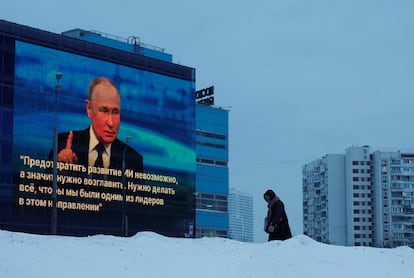Putin’s great Russian people
Unhappy soldiers and women waiting for their men to come home from war can have a much heavier social impact than opposition movements

The Kremlin received over two million questions for President Vladimir Putin’s annual press conference and address to the nation. Unlike previous years, the two events were combined into a single, four-hour marathon for all the world to see.
Dmitry Peskov, Putin’s press secretary, was asked by the Moscow press corps why citizens mobilized for the war (the Special Military Operation in the Kremlin’s parlance) in the fall of 2022 are not part of a rotation system and do not have discharge dates. Their relatives want the return of loved ones they have only seen during brief vacations overshadowed by the anguish of returning to the front. Local authorities avoid these wives and mothers who are taking to the streets more frequently in protest.
Russian journalists were speculating on whether Putin would have the courage to respond to the families of the mobilized soldiers. The question even appeared on a screen behind a commentator on Russia’s number one television channel, but quickly disappeared.
Putin covered everything from the Russian egg shortage to Argentine politics, but deliberately avoided the issue of the mobilized soldiers. While he mentioned that “there is currently no need” for another mass mobilization, he offered no assurances about the future.
The autumn 2022 mobilization called up 300,000 conscripts. According to Putin’s own statement, there are 617,000 Russians involved in the war effort, 486,000 of which are volunteers. Putin made a point of saying this number increases by 1,500 people every day. And he said there are 244,000 mobilized soldiers in the combat zone.
During Putin’s press conference, some concerns about Russian combatants were addressed, along with the issues faced by private military companies, including the ill-fated Yevgeny Prigozhin’s Wagner Group. A man dressed in camouflage named Sobolev complained about not receiving any veteran benefits despite fighting in the war with one of these private companies. Putin replied by saying these organizations do not officially exist, which is true according to Russian law. But as the whole world knows, they certainly do exist.
Putin blamed his own Ministry of Defense for creating a problem when it established “various relationships” with the commanders of these companies. “Unfortunately, payments were made in cash,” said the president, “and now it is very difficult to even establish a list” of the members of those private military companies. Putin thus acknowledged a mercenary hiring system in which a chief is paid for the overall job and then distributes wages to the workers. He said that the rights of these fighters should be acknowledged and they should treated as regular soldiers. Putin pledged to address the matter, potentially through legal reforms. Yet he offered no explanation for the inaction so far.
Simmering discontent
According to a survey conducted by the Levada Center, the majority of citizens (21%) expressed interest in hearing Putin talk about war-related topics such as the end of mobilization and when victory would be achieved. One notable finding in this survey is that 10% of respondents had no interest in asking Putin anything or even watching him on TV. About 8% expressed interest in hearing about social and economic issues.
The unanswered or evasively answered questions by Putin shed light on two areas of discontent among his most loyal and engaged followers — those who have supported and enabled the invasion of Ukraine. Although this discontent lacks formal structure like a movement or a party, it undeniably exists, and it differs greatly from the largely exiled opposition advocating for the democratization of Russia. Those who seek political change in Russia are primarily focused on how to approach the upcoming presidential elections in March.
Freedom fighters and democracy advocates face relentless punishment from the regime and limited support among the Russia people. Conversely, the women who wait and the men who fight are part of the majority that supports the regime. This majority does not question the war itself, but is unhappy about the treatment of loyal servants of a country represented by Putin. This is why discontent among the majority can have a much heavier social impact than than the largely neutralized opposition movements.
Brining mobilized soldiers back home would mean reintegrating war-hardened men into society. They deserve dignified positions and respect, both economically and morally, for defending the system. Replacing them with civilians lacking war experience may trigger protests, as seen in the first mobilization.
The women who wait and the men who fight in Ukraine make up the “great Russian people” in whom Putin now trusts after placing too much faith in the presumed allies who failed him in 2000. The annals of history serve as a stark reminder of the profound repercussions that ensued from a discontented Russian populace at the dawn of the 20th century.
Sign up for our weekly newsletter to get more English-language news coverage from EL PAÍS USA Edition
Tu suscripción se está usando en otro dispositivo
¿Quieres añadir otro usuario a tu suscripción?
Si continúas leyendo en este dispositivo, no se podrá leer en el otro.
FlechaTu suscripción se está usando en otro dispositivo y solo puedes acceder a EL PAÍS desde un dispositivo a la vez.
Si quieres compartir tu cuenta, cambia tu suscripción a la modalidad Premium, así podrás añadir otro usuario. Cada uno accederá con su propia cuenta de email, lo que os permitirá personalizar vuestra experiencia en EL PAÍS.
¿Tienes una suscripción de empresa? Accede aquí para contratar más cuentas.
En el caso de no saber quién está usando tu cuenta, te recomendamos cambiar tu contraseña aquí.
Si decides continuar compartiendo tu cuenta, este mensaje se mostrará en tu dispositivo y en el de la otra persona que está usando tu cuenta de forma indefinida, afectando a tu experiencia de lectura. Puedes consultar aquí los términos y condiciones de la suscripción digital.









































